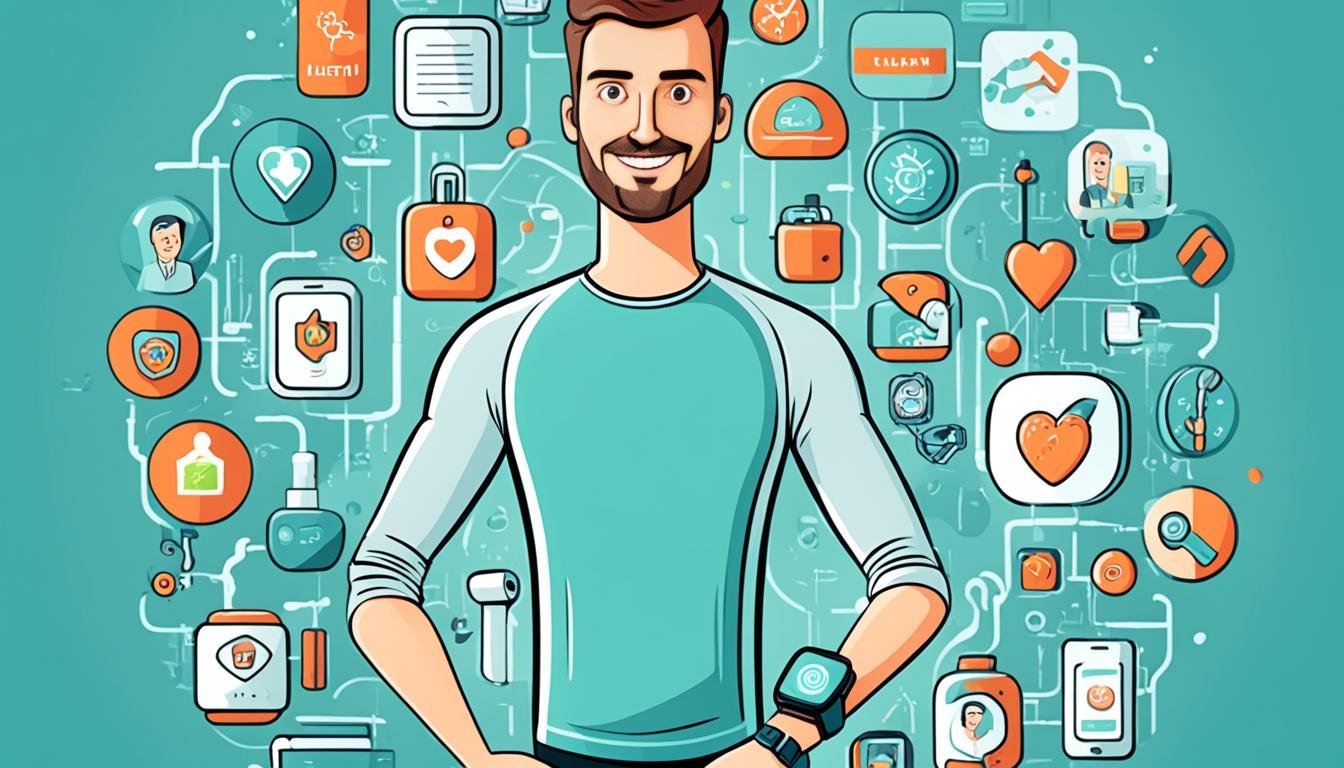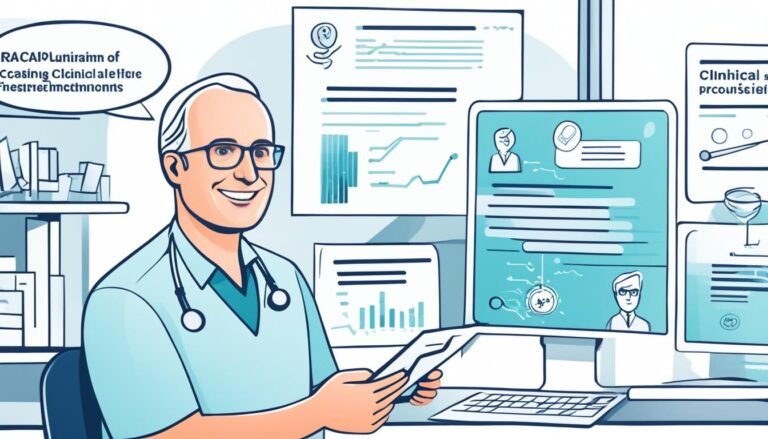AI-Driven Mobile Health Applications and Wearables
Did you know that artificial intelligence (AI) is revolutionizing the healthcare industry through mobile health applications and wearables? These innovative technologies utilize AI algorithms and machine learning to transform the way we monitor and manage our health. From personalized health monitoring to remote patient monitoring, AI-powered healthcare devices are making a significant impact on our well-being.
AI-driven mobile health apps and wearable devices offer a range of benefits, including improved diagnostic support, in-depth analysis of healthcare operations, and simplification of diagnostic imaging processes. With their ability to deliver personalized care, these solutions are taking healthcare innovation to new heights.
Key Takeaways:
- AI-driven mobile health applications and wearables leverage artificial intelligence to enhance personal healthcare.
- These technologies offer personalized health monitoring, diagnostic support, and remote patient monitoring.
- Benefits of AI in mobile health include improved detection of deceitful activities and simplified diagnostic imaging processes.
- AI enables in-depth analysis of healthcare operations and assistance in repetitive healthcare tasks.
- AI-driven wearable devices revolutionize diabetes management and offer noninvasive glucose monitoring.
The Role of AI in Mobile Health Apps
AI-driven mobile health applications (mHealth apps) are at the forefront of healthcare innovation, leveraging advanced AI algorithms and machine learning to enhance the field of personalized healthcare. These apps play a crucial role in optimizing health monitoring, diagnostic support, and remote patient monitoring.
Personalized Health Monitoring
AI algorithms analyze vast amounts of data collected from wearable devices and sensors, enabling mHealth apps to provide personalized health monitoring. By utilizing machine learning techniques, these apps can identify patterns and indicators within user data, allowing for tailored health recommendations and interventions. This personalized approach fosters proactive health management and empowers individuals to take control of their well-being.
Diagnostic Support
Mobile health apps equipped with AI algorithms assist healthcare professionals and users in making accurate diagnoses. By comparing symptoms to comprehensive medical databases, these apps offer valuable insights and suggestions for further investigation. This diagnostic support aids in timely intervention, improving patient outcomes and streamlining healthcare delivery.
Remote Patient Monitoring
AI-driven mHealth apps facilitate remote patient monitoring, enabling healthcare providers to track patients’ health parameters without the need for in-person visits. These apps continuously analyze and interpret real-time data, allowing for timely intervention and reducing the burden on healthcare systems. Remote patient monitoring enhances patient outcomes, particularly for individuals with chronic conditions who require ongoing care.
“AI algorithms in mobile health apps revolutionize the way healthcare is delivered, providing personalized health monitoring, diagnostic support, and remote patient monitoring.”– Dr. Sarah Thompson, HealthTech Magazine
By harnessing the power of AI, mobile health apps have the potential to transform healthcare delivery and improve patient outcomes. These innovative solutions empower individuals to actively manage their health while providing valuable support to healthcare professionals. With continuous advancements in AI algorithms and machine learning, the future of mobile health apps appears promising, leading to enhanced healthcare efficiency, personalized care, and improved well-being.
Benefits of AI in Mobile Health
The benefits of AI in mobile health are manifold. AI algorithms have revolutionized the healthcare industry, offering numerous advantages that enhance patient care and improve overall healthcare outcomes.
One major benefit of AI in mobile health is the improved detection of deceitful activities in healthcare. AI systems can analyze vast amounts of data to identify fraudulent billing practices, helping to eliminate unnecessary costs and ensure fair practices.
Additionally, AI provides valuable assistance in clinical decision-making. By analyzing patient data and medical literature, AI algorithms can offer treatment suggestions and help healthcare professionals make more informed decisions.
Customized online consultations are another advantage of AI in mobile health. AI-driven chatbots can analyze symptoms and offer preliminary health assessments, providing individuals with personalized and convenient healthcare guidance.
AI also enables in-depth analysis of healthcare operations, optimizing resource allocation and enhancing patient care. By analyzing data from various sources, including patient records and operational metrics, AI can help healthcare organizations identify areas for improvement and implement more effective strategies.
Furthermore, AI simplifies diagnostic imaging processes, improving accuracy and speed. Advanced AI algorithms can analyze medical images such as x-rays or MRI scans, assisting healthcare professionals in detecting anomalies and making accurate diagnoses.
Finally, AI assists in automating repetitive healthcare tasks, freeing up healthcare professionals’ time for more critical patient care. By automating tasks such as data entry and administrative work, AI allows healthcare providers to focus on providing personalized care and improving patient outcomes.
AI in mobile health brings a wide range of benefits, including improved detection of deceitful activities, clinical decision-making assistance, customized online consultations, in-depth analysis of healthcare operations, simplification of diagnostic imaging processes, and assistance in repetitive healthcare tasks. These advantages contribute to enhanced patient care and overall healthcare efficiency.
Overall, the integration of AI in mobile health offers significant advantages that improve patient care, streamline healthcare operations, and enhance healthcare outcomes. As AI continues to advance, we can expect even more innovative applications that revolutionize the healthcare industry.
| Benefit | Description |
|---|---|
| Improved detection of deceitful activities | AI algorithms analyze data to identify fraudulent billing practices and eliminate unnecessary costs. |
| Clinical decision-making assistance | AI analyzes patient data and medical literature to offer treatment suggestions. |
| Customized online consultations | AI-driven chatbots analyze symptoms and offer personalized healthcare guidance. |
| In-depth analysis of healthcare operations | AI optimizes resource allocation and identifies areas for improvement in healthcare operations. |
| Simplification of diagnostic imaging processes | AI algorithms analyze medical images, improving accuracy and speed in diagnosis. |
| Assistance in repetitive healthcare tasks | AI automates tasks such as data entry, freeing up healthcare professionals’ time for patient care. |
AI Applications in Mobile Health
AI has revolutionized the field of mobile health with its wide range of applications. One prominent application is the development of personalized virtual health assistants. These assistants utilize AI algorithms to analyze user data and provide tailored medical guidance. By leveraging AI, these virtual assistants can offer personalized treatment recommendations, answer health-related questions, and provide valuable support to users.
In addition to personalized virtual health assistants, AI has the capability to pinpoint health trends through data analysis. With the vast amount of data collected through wearables, AI algorithms can identify patterns and correlations, enabling proactive health management. This data-driven approach allows healthcare professionals to identify and address potential health issues before they escalate, leading to improved patient outcomes.
Furthermore, AI is revolutionizing diagnosis in mobile health by interpreting medical images with high accuracy and efficiency. AI-powered algorithms can analyze medical imaging data, such as X-rays or MRIs, and provide diagnostic insights, aiding healthcare professionals in making accurate diagnoses. This not only streamlines the diagnostic process but also enhances patient care by reducing misdiagnoses and enabling prompt treatment.
One critical aspect of mobile health is the security of sensitive health data. AI plays a vital role in securing this data by continuously monitoring, detecting, and adapting to potential threats. AI-powered security systems can identify anomalies and suspicious activities, ensuring the privacy and integrity of sensitive health information.
AI applications in mobile health encompass personalized virtual health assistants, pinpointing health trends through data analysis, revolutionizing diagnosis, and securing sensitive health data.
With the rapid advancement of AI technologies, the applications in mobile health continue to expand. From personalized guidance to improved diagnosis and security, AI is transforming the way healthcare is delivered and experienced by individuals worldwide.
Determining Mobile Health Application Effectiveness
The effectiveness of mobile health applications depends on several key factors that contribute to their overall performance and user satisfaction. These factors include the ease of use and design of the app, the accuracy of data analysis, system compatibility and privacy, and integration with healthcare systems.
Ease of use and design: Mobile health applications must be user-friendly and intuitive to ensure seamless navigation and engagement. A well-designed app with a clear interface and easy-to-understand features enhances user experience and encourages regular use. By prioritizing usability, developers can increase user adoption and promote better health outcomes.
Accuracy of data analysis: The accuracy of data analysis is of utmost importance for mobile health applications, especially those that monitor critical health parameters such as glucose levels. Precise and reliable data analysis ensures accurate insights and actionable information for users, enabling better decision-making regarding their health. Healthcare providers rely on accurate data analysis to deliver appropriate care and treatment.
System compatibility and privacy: Mobile health applications must be compatible with various operating systems and devices to reach a wider user base. Compatibility across different platforms, such as iOS and Android, allows users to access the app regardless of their device preference. Additionally, ensuring robust privacy measures and compliance with data protection regulations is essential to maintain user trust and safeguard their sensitive health information.
“The effectiveness of mobile health applications is highly dependent on the ease of use, accuracy of data analysis, system compatibility, and privacy measures.”
Integration with healthcare systems: Seamless integration with healthcare systems is crucial for mobile health applications to provide comprehensive and efficient healthcare services. Integration enables healthcare professionals to access patient data, facilitate remote monitoring, and coordinate care effectively. Mobile health apps that can seamlessly integrate with existing healthcare systems improve care coordination, enhance communication, and streamline workflows.
By evaluating and addressing these factors, developers and healthcare providers can determine the effectiveness of mobile health applications. Prioritizing ease of use, accuracy of data analysis, system compatibility and privacy, as well as integration with healthcare systems, ensures that mobile health apps deliver the intended benefits and positively impact patient outcomes.
AI-Driven Wearable Devices for Diabetes
AI-driven wearable devices are revolutionizing diabetes management. These innovative devices focus on monitoring blood glucose levels and utilize advanced AI algorithms to estimate and predict glucose levels, enhancing the accuracy and effectiveness of diabetes monitoring and care.
One of the key advantages of AI-driven wearable devices is their ability to provide continuous and real-time blood glucose measurement. These devices, such as wrist-worn devices, incorporate various sensors that collect data on glucose levels throughout the day. By leveraging machine learning models, such as support vector machines and random forests, these devices analyze the collected data to estimate and predict glucose levels with high levels of accuracy.
These commercially available AI-driven wearable devices offer individuals with diabetes valuable insights into their blood glucose levels, empowering them to make informed decisions about their diet, medication, and lifestyle choices. The integration of machine learning models enables precise predictions of glucose levels, aiding in the prevention of hyperglycemic or hypoglycemic episodes.
Additionally, AI algorithms utilized in these wearable devices continually learn and adapt to individual patterns and responses, allowing for personalized glucose level estimation and early detection of potential fluctuations. By providing individuals with real-time notifications and alerts, these devices help them proactively manage and control their diabetes, leading to improved overall health outcomes.
AI-driven wearable devices for diabetes revolutionize glucose monitoring, providing individuals with continuous, accurate, and personalized insights into their blood glucose levels. By leveraging advanced AI algorithms and machine learning models, these devices empower individuals to take control of their diabetes management and make informed decisions for better health outcomes.
| Advantages of AI-Driven Wearable Devices for Diabetes | Examples of Commercially Available Devices |
|---|---|
|
|
These AI-driven wearable devices represent a significant breakthrough in diabetes management, offering individuals with diabetes enhanced control over their health and well-being. As technology continues to evolve, the integration of AI algorithms and wearable devices is expected to further enhance diabetes monitoring and care, enabling more precise and personalized management strategies.
AI-Enabled Advances in Diabetes Monitoring
AI-enabled advances in diabetes monitoring utilize cutting-edge technology to provide noninvasive solutions for glucose monitoring. With the help of wearable sensors, individuals can track their glucose levels without the need for frequent finger-prick tests. These wearable sensors, equipped with AI algorithms and machine learning (ML) models, revolutionize diabetes management by offering personalized analytics and remote patient monitoring.
Through AI algorithms, these wearable sensors analyze the data collected from continuous glucose monitoring (CGM) devices, providing real-time insights into glucose levels. The ML models embedded in these devices enable accurate estimation and prediction of glucose levels, giving individuals a comprehensive understanding of their diabetes management and helping them make informed decisions regarding diet, exercise, and medication.
Remote patient monitoring is a key feature of AI-enabled diabetes monitoring. Healthcare professionals can securely access patients’ glucose data remotely, allowing for timely interventions and personalized care. This capability improves patient outcomes and reduces the need for frequent hospital visits, empowering individuals to take control of their health from the comfort of their own homes.
Benefits of AI-Enabled Diabetes Monitoring
- Noninvasive: AI-enabled diabetes monitoring eliminates the need for frequent finger-prick tests, providing a more comfortable and convenient glucose monitoring experience.
- Personalized Analytics: AI algorithms analyze glucose data and provide personalized analytics, empowering individuals to make informed decisions regarding their diabetes management.
- Remote Patient Monitoring: Healthcare professionals can remotely access patients’ glucose data, ensuring timely interventions and personalized care.
- Improved Outcomes: AI-enabled diabetes monitoring enhances patient outcomes by enabling proactive management of glucose levels and minimizing the risk of complications.
Advancements in AI Algorithms and ML Models
Continuous advancements in AI algorithms and ML models have propelled the accuracy and capabilities of AI-enabled diabetes monitoring. These technologies strive to offer real-time glucose monitoring with unparalleled precision and reliability. The integration of AI algorithms and ML models allows for dynamic and personalized glucose predictions, based on individual patterns and behavior.
AI algorithms continuously learn from user data, adapting to individual variations and ensuring accurate glucose predictions. ML models, such as support vector machines and random forests, form the foundation for data analysis and enable accurate and reliable predictions. This integration of AI and ML technology in diabetes monitoring devices ensures accurate and personalized care for individuals with diabetes.
Future Trends in AI-Enabled Diabetes Monitoring
The future of AI-enabled diabetes monitoring holds promising advancements. These include the development of wearable sensors that can monitor other relevant health parameters, such as heart rate, physical activity, and sleep patterns, providing individuals with a comprehensive view of their overall health. Additionally, advancements in AI algorithms will further enhance the accuracy and predictive capabilities of glucose monitoring devices, leading to more precise and timely interventions.
Furthermore, the integration of AI-enabled diabetes monitoring with telemedicine platforms allows for seamless communication between individuals with diabetes and healthcare professionals. Remote consultations, feedback, and personalized treatment plans can be tailored based on real-time glucose data, optimizing diabetes management and improving healthcare outcomes.
| AI-Enabled Diabetes Monitoring | Benefits |
|---|---|
| Noninvasive glucose monitoring through wearable sensors | Eliminates the need for frequent finger-prick tests |
| AI algorithms and ML models | Provide personalized analytics for informed decision-making |
| Remote patient monitoring | Ensures timely interventions and personalized care |
| Advancements in AI algorithms and ML models | Enhance accuracy and predictive capabilities |
| Future trends | Integration with telemedicine platforms for optimized diabetes management |
AI in Mobile Health for Chronic Disease Management
AI plays a crucial role in mobile health for chronic disease management. These applications offer personalized care plans, including medication reminders, symptom tracking, and lifestyle recommendations. AI algorithms analyze user data to predict disease progression and optimize treatment strategies, leading to improved patient outcomes. By empowering individuals to actively manage their chronic conditions, AI-driven mobile health apps enhance overall healthcare and quality of life.
Benefits of AI in Chronic Disease Management
Personalized Care Plans: AI-driven mobile health apps provide individualized care plans tailored to each patient’s specific needs, taking into account their medical history, current condition, and lifestyle factors.
Medication Reminders: With AI-powered reminders, patients receive timely alerts to take their medications, ensuring adherence to treatment plans and reducing the risk of missed doses.
Symptom Tracking: AI algorithms in mobile health apps enable patients to track their symptoms, analyze patterns over time, and provide valuable data to healthcare providers for better disease management.
Predictive Analytics: By analyzing patient data, AI algorithms can predict disease progression and identify potential complications, allowing for early interventions and targeted treatment strategies.
Improved Patient Outcomes
By leveraging AI in chronic disease management, mobile health apps have the potential to significantly improve patient outcomes. With personalized care plans, patients receive tailored interventions and support, leading to better disease control and overall well-being.
“AI algorithms analyze user data to predict disease progression and optimize treatment strategies, leading to improved patient outcomes.”
Additionally, medication reminders help patients adhere to their prescribed regimens, preventing medication errors and improving treatment effectiveness. Symptom tracking allows for early detection of worsening symptoms or potential complications, enabling timely interventions and better disease management.
“AI-driven mobile health apps enhance overall healthcare and quality of life.”
The integration of predictive analytics in AI-driven mobile health apps enables healthcare providers to anticipate disease progression, identify at-risk patients, and adjust treatment plans accordingly. This proactive approach improves patient outcomes and reduces healthcare costs by minimizing emergency interventions and hospitalizations.
The Future of Chronic Disease Management with AI
As AI continues to advance, the future of chronic disease management looks promising. AI algorithms will become more sophisticated, capable of analyzing vast amounts of patient data in real-time and adapting treatment plans accordingly. In combination with wearable devices and remote monitoring technologies, AI-powered mobile health apps will create a comprehensive ecosystem for managing chronic conditions.
With the potential to revolutionize chronic disease management, AI in mobile health holds the key to personalized and proactive healthcare. By empowering individuals to actively participate in their own care, these AI-driven solutions are shaping a future where chronic diseases can be effectively controlled and managed, leading to improved patient outcomes and enhanced quality of life.
Telemedicine and AI in Mobile Health
Telemedicine combined with AI in mobile health has revolutionized healthcare delivery, particularly during the COVID-19 pandemic. Virtual healthcare consultations allow for remote monitoring, reducing the need for in-person visits and improving healthcare accessibility.
AI algorithms enhance the accuracy of remote diagnostic assessments, enabling timely interventions and reducing the burden on healthcare systems. By leveraging AI-driven mobile health solutions, healthcare providers can effectively triage patients, provide remote care, and prioritize resources for those in need. The integration of telemedicine and AI technologies has become crucial in ensuring continuity of care, especially in situations where physical access to healthcare facilities is limited.
Through virtual healthcare consultations, patients can receive professional medical advice and guidance from the comfort of their own homes. This not only eliminates the barriers of geographical distance but also helps reduce the risk of disease transmission, such as during a pandemic. Virtual consultations enable patients and healthcare providers to address non-emergency medical issues efficiently, without the need for unnecessary hospital visits.
AI-powered mobile health apps also enable remote monitoring of patients’ health conditions. By collecting data on vital signs, symptoms, and other health parameters, these apps provide valuable insights to healthcare professionals. This data can assist in the early detection of health issues, allowing for timely interventions and improving overall patient outcomes.
Additionally, AI algorithms help analyze large datasets, identifying patterns and trends that aid in predicting and preventing potential health issues. By leveraging these insights, healthcare providers can implement proactive measures and interventions to improve patient health and prevent the progression of chronic diseases.
Telemedicine and AI-driven mobile health solutions have opened new avenues for improving healthcare accessibility and delivery. These technologies have the potential to bridge the gap between patients and healthcare providers, empowering individuals to take control of their health and enabling healthcare systems to efficiently allocate resources. As we move forward, the integration of telemedicine and AI will continue to play a pivotal role in shaping the future of healthcare.
With the COVID-19 pandemic highlighting the importance of accessible healthcare solutions, the adoption of telemedicine and AI in mobile health has accelerated. These technologies have proven to be effective in ensuring patients receive the care they need while minimizing the risk of exposure to contagious diseases.
By combining the convenience of virtual healthcare consultations and the power of AI-driven mobile health solutions, healthcare accessibility can be improved for individuals who may face barriers in accessing traditional healthcare services. Telemedicine and AI have the potential to reach underserved populations, remote areas, and communities lacking sufficient healthcare infrastructure. This enables healthcare providers to extend their services to a wider population, ensuring that no one is left behind.
The future of healthcare lies in the integration of telemedicine and AI-driven mobile health solutions. The advancements in technology and the increasing availability of mobile devices make it possible to deliver quality healthcare remotely, improving accessibility and patient outcomes. As we continue to embrace these innovations, the healthcare landscape will continue to evolve, ultimately leading to a more inclusive and patient-centric healthcare system.
Conclusion
AI-driven mobile health applications and wearables have ushered in a new era of healthcare innovation. By seamlessly integrating artificial intelligence with wearable health tech, these advancements have revolutionized how individuals manage their health. Through personalized care, improved disease monitoring capabilities, and efficient healthcare delivery, AI-driven mobile health applications and wearables have become indispensable tools for individuals seeking to optimize their well-being.
As technology continues to advance, the potential for AI-powered solutions in healthcare is boundless. These AI-driven innovations will play an increasingly substantial role in enhancing healthcare outcomes and improving the overall quality of care. By harnessing the power of artificial intelligence, wearable health tech continues to shape the future of healthcare, inspiring new possibilities and pushing the boundaries of what was once thought possible.
AI-Driven Mobile Health Applications and Wearables are not just transformative but imperative in the pursuit of optimal health and well-being. With healthcare becoming more personalized and accessible than ever before, individuals can now take control of their own health journeys, supported by cutting-edge technologies that analyze data, offer real-time insights, and provide personalized recommendations. The integration of artificial intelligence and wearable health tech represents a powerful combination that holds the key to unlocking improved healthcare outcomes for individuals worldwide.






